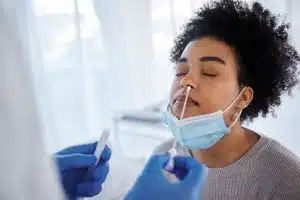
In the beginning, what was there?
Since the beginning of the pandemic, scientists have been working hard to find solutions for COVID-19. The CDC has introduced multiple ways that could lessen the number of cases we have today. One solution includes an HPV PCR test near me. But are there more solutions available for the general public to try?
People may use two forms of screening.
- Nucleic acid amplification. Or molecular method. People also call them genetic, RNA, or PCR.
- The antibody check. It’s also called serology.
Which is the most recommended method?
This article will review two types. Read on to learn more about virus checks and their future.
Molecular (Nucleic Acid Amplification)
How are nucleic acid amplification Covid-19 kits used? Nucleic acid amplification requires patient respiratory samples because SARS-CoV-2 is a respiratory virus. We often see nasopharyngeal swabs. HPV Doctors may also use sputum or other fluids from the lower respiratory system. Yet, they can use these COVID-19 kits when a patient has pneumonia or anything involving the lungs. The next step requires the examination and processing of samples. This includes removing RNA from the patient specimen. Besides, it consists of converting it to DNA and amplifying a PCR exam with specific primers.
What does nucleic acid amplification reveal?
These tell us whether an individual has Covid-19. After all, they screen for any characteristic patterns of RNA in samples. If these detect viral RNA, this indicates the pathogen could be active.
Are there issues with the checks?
Molecular checks can produce a false-negative result. For example, if the level of viral RNA in a given sample is too low for detection. Take steps to ensure that examinations are well performed. Otherwise, that would skew the results. Those procedures should help ensure the consistency of the results.
What is the other method?
Unlike the HPV test clinic, the antibody or serology methods differ. During a reaction to injury, the immune system generates proteins, which form antibodies. Antibodies on the surface of pathogens detect foreign molecules or antigens. Later, an antibody links to an antigen. It aims to deactivate the associated pathogen by direct or indirect mechanisms. Blood represents the type of experiment used for an antibody. SARS-CoV-2-specific antigens combine with the patient’s blood.
Are these present in the blood?
Then, these may attach themselves, resulting in a colour difference that indicates a successful check. These COVID-19 kits evaluate the number of antibodies released. The body produces antibodies in reaction to an infection. They do not check for the pathogen itself, thus not stating whether a person is infected.
What does this reveal?
These kits detect the presence of antibodies produced.
How long does it take to develop?
According to the CDC, a patient usually takes 1 to 2 weeks to develop antibodies. It also does not reveal how long the protective immunity to infection will last if it does develop. They will help inform various decisions. For example, it guides policies about the safety of returning to normal activities. Determining these concerns is essential.
Is there an accuracy concern?
Antibody checks can produce a false-negative result if one does the analysis too early, compared to a PCR test near me, which is very accurate. The antibodies need to develop, so they can yield a false positive. Thorough usage of these solutions will provide a full image of the number of people with the disease. Checks can be performed at the nearest clinic, which will also help produce surveillance data. At the same time, we must track the spread of the disease.
